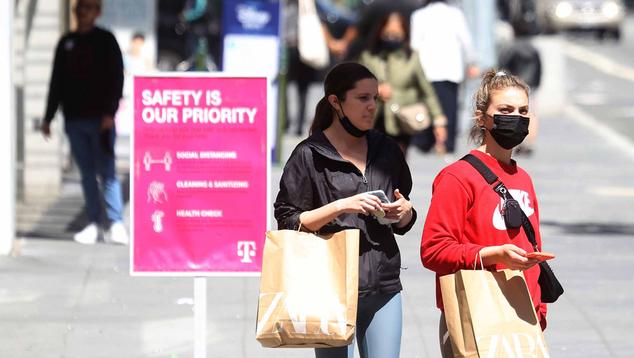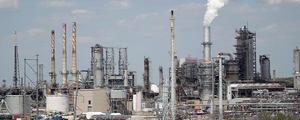Story Highlights
- Economic Confidence Index +2 in April
- First time in positive territory since early March 2020
- Majority confident in Biden's ability to handle the economy
WASHINGTON, D.C. -- Gallup's Economic Confidence Index registered a score of +2 in April, the first time it has been net positive since early March 2020, just before then-President Donald Trump declared a national emergency amid rising coronavirus infections. The U.S. entered a brief but severe recession as business activity slowed amid stay-at-home orders, with the index dropping to -32 in early April.
Americans' economic evaluations improved in the ensuing months, staying just inside negative territory at -1 immediately after the presidential election. Confidence slumped again amid rising COVID-19 infections and deaths in the U.S., dropping back to -21 in January, before improving in each of the past three months, including a nine-point increase this month.
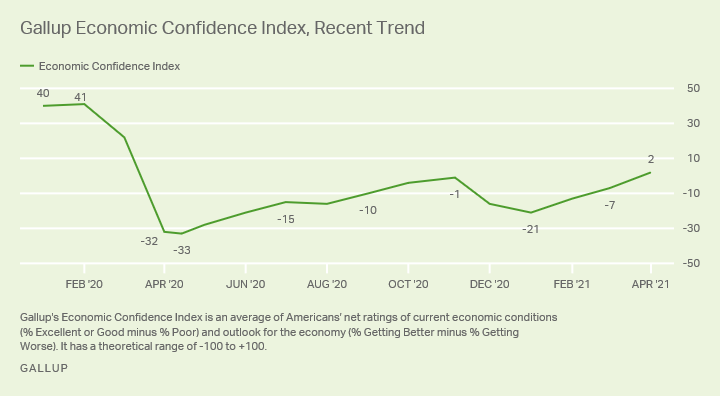
Line graph. Recent trend in Gallup's Economic Confidence Index. The index is +2 in April after being in negative territory since the pandemic began in the U.S.
The latest results are based on an April 1-21 survey. Gallup's Economic Confidence Index summarizes Americans' ratings of current U.S. economic conditions and their belief in whether the economy is getting better or worse. It has a theoretical range of +100 -- if all Americans thought current conditions were excellent or good and that the economy was improving, to -100 -- if all Americans rated conditions as poor and said the economy was getting worse. Both index components are barely positive this month.
Current Economy Evaluations Improved, but Have Been Better During Pandemic
In the new survey, 28% describe current economic conditions as either excellent or good, while 26% say they are poor. Last month, 23% rated current conditions as excellent or good and 31% as poor.
The April ratings are not the best they have been for this aspect of the index during the pandemic. In November, positive evaluations of current economic conditions exceeded negative ones by 13 percentage points -- 36% to 23%. Several other months last year, Americans' ratings of economic conditions were similar to what they are now.
At their worst point during the pandemic, in late April and May 2020, negative evaluations exceeded positive assessments by 20 points.
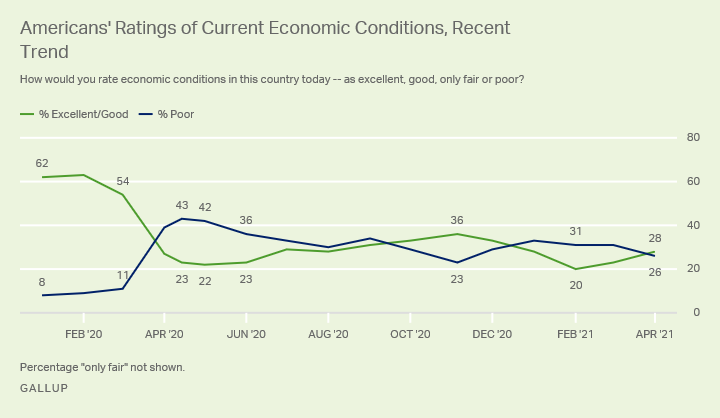
Line graph. Recent trend in Americans' ratings of current economic conditions. Currently, 28% rate conditions positively while 26% rate them negatively. Before the pandemic, Americans were far more positive than negative, with 62% rating conditions excellent or good and 8% poor. That changed quickly in April 2020, with 27% rating conditions excellent or good and 39% poor.
Economic Outlook Net Positive for First Time Since Last Spring
While ratings of the current economy have been better in some recent months than they are now, Americans' belief in where the economy is headed is more positive than at any time during the pandemic. Currently, 47% of U.S. adults believe the economy is getting better and 46% worse, the first rating that was not more negative than positive since March 2020.
A year ago, when most of the country was living under stay-at-home orders, 22% said the economy was getting better and 74% worse. Even in November, when Americans were relatively upbeat about current economic conditions, a solid majority of 55% said the economy was getting worse.
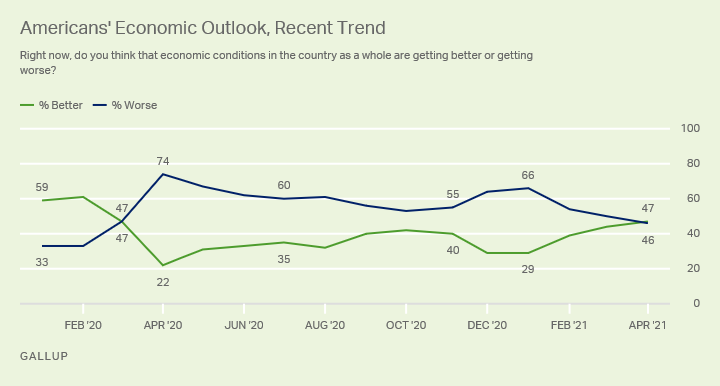
Line graph. Recent trend in Americans' economic outlook. Since the pandemic began, Americans have been significantly more likely to say the economy is getting worse than to say it is getting better. Now, 47% say it is getting better and 46% say it is getting worse.
Majorities Confident in U.S. Economic Leaders
As President Joe Biden prepares to address Congress this week and outline his economic proposals, the poll finds 57% of Americans expressing "a great deal" or "a fair amount" of confidence in him to "do or to recommend the right thing for the economy." His economic confidence rating matches his overall job approval rating in the April 1-21 survey.
A majority of Americans also express confidence in two of the president's chief economic advisers -- Federal Reserve Chairman Jerome Powell and Treasury Secretary (and former Federal Reserve Chair) Janet Yellen. Americans are somewhat less confident in Democratic leaders in Congress as a whole and much less confident in Republican congressional leaders.
| Great deal | Fair amount | Only a little | Almost none | ||||||||||||||||||||||||||||||||||||||||||||||||||||||||||||||||||||||||||||||||||||||||||||||||
|---|---|---|---|---|---|---|---|---|---|---|---|---|---|---|---|---|---|---|---|---|---|---|---|---|---|---|---|---|---|---|---|---|---|---|---|---|---|---|---|---|---|---|---|---|---|---|---|---|---|---|---|---|---|---|---|---|---|---|---|---|---|---|---|---|---|---|---|---|---|---|---|---|---|---|---|---|---|---|---|---|---|---|---|---|---|---|---|---|---|---|---|---|---|---|---|---|---|---|---|
| % | % | % | % | ||||||||||||||||||||||||||||||||||||||||||||||||||||||||||||||||||||||||||||||||||||||||||||||||
| President Joe Biden | 30 | 27 | 12 | 31 | |||||||||||||||||||||||||||||||||||||||||||||||||||||||||||||||||||||||||||||||||||||||||||||||
| Federal Reserve Chairman Jerome Powell | 12 | 43 | 17 | 17 | |||||||||||||||||||||||||||||||||||||||||||||||||||||||||||||||||||||||||||||||||||||||||||||||
| Treasury Secretary Janet Yellen | 17 | 37 | 17 | 20 | |||||||||||||||||||||||||||||||||||||||||||||||||||||||||||||||||||||||||||||||||||||||||||||||
| The Democratic leaders in Congress | 17 | 32 | 15 | 34 | |||||||||||||||||||||||||||||||||||||||||||||||||||||||||||||||||||||||||||||||||||||||||||||||
| The Republican leaders in Congress | 7 | 32 | 26 | 35 | |||||||||||||||||||||||||||||||||||||||||||||||||||||||||||||||||||||||||||||||||||||||||||||||
| Gallup April 1-21, 2021 | |||||||||||||||||||||||||||||||||||||||||||||||||||||||||||||||||||||||||||||||||||||||||||||||||||
Biden's economic confidence rating is higher than those given to his predecessor, Trump, which ranged between 42% and 48% during his four years in office. This is the case even though Trump's approval ratings for handling the economy were mostly above the majority level.
While Biden's first-year economic confidence rating of 57% exceeds Trump's first-year rating, from 2017, by nine points, it is not as strong as Barack Obama's (71% in 2009) and George W. Bush's (68% in 2001) first-year ratings.
Powell's 55% rating is essentially unchanged from last year (58%). Meanwhile, Yellen's 54% confidence score is similar to that for her predecessor, Steve Mnuchin (51%), the Trump administration's chief negotiator in last year's stimulus legislation discussions with Congress.
Perhaps the most notable change from a year ago is the decline in confidence in Republican congressional leaders to take the right economic actions, from 47% to 39%. Still, the current figure for Republicans is well above their low point of 24% in 2014.
Confidence in Democratic leaders is essentially unchanged from last year, but the 49% measured this year is nominally the highest since 51% in 2009.
Since 2007, Americans have typically been more confident in Democratic congressional leaders than in Republicans. The current 10-point gap in confidence for Democrats versus Republicans is one of the largest Gallup has measured.
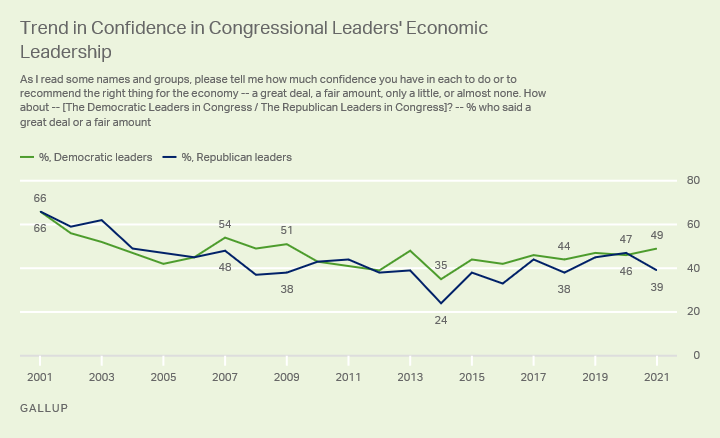
Line graph: Trend in confidence in Democratic and Republican leaders to do or to recommend the right thing for the economy. Americans have usually had more confidence in Democrats than Republicans. The current 10-point gap is among the largest measured.
Bottom Line
Americans' optimism about the economy's direction is improving, and for the first time in over a year, Gallup's Economic Confidence Index has a positive score. Many experts believe the series of economic stimulus actions taken in the past year helped limit the economic damage from the coronavirus, and many also expect 2021 to be a strong year of economic growth.
Of course, those predictions rest on the assumption that the coronavirus will be largely under control this year as more Americans get vaccinated from it. If the spread of COVID-19 is kept to a minimal level, more businesses and public places can re-open or accommodate larger numbers of customers. Those developments could unleash a surge of pent-up consumer demand as the public has largely avoided traveling or attending events with large crowds for over a year.
View complete question responses and trends (PDF download).
Learn more about how the Gallup Poll Social Series works.
